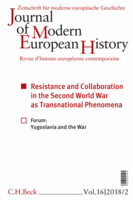
Journal of Modern European History
Scope & Guideline
Delving into the Dynamics of European History
Introduction
Aims and Scopes
- European Integration and Identity:
The journal explores the historical perspectives on European integration, focusing on the political, legal, and social dimensions that shape European identity and cohesion. - Cultural Memory and Historical Narratives:
It emphasizes the role of memory in shaping historical narratives, particularly concerning events like World War II, genocide, and national identity. - Transnational and Comparative History:
The journal promotes transnational studies and comparative analyses that highlight the interconnectedness of European histories across borders. - Political History and Governance:
Research on the evolution of political structures, governance, and public opinion in various European contexts is a core focus, examining the impact of historical events on contemporary politics. - Social Movements and Marginalized Voices:
The journal seeks to amplify the voices and experiences of marginalized groups throughout history, including refugees, ethnic minorities, and women, in the context of broader social movements. - Legal History and Human Rights:
There is a notable focus on the intersection of law and history, particularly regarding human rights and the legal ramifications of historical events.
Trending and Emerging
- Migration, Refugees, and Displacement:
There is an increasing focus on the historical and contemporary implications of migration and refugee experiences in Europe, highlighting the socio-political challenges and transformations influenced by these movements. - Memory Studies and Historical Trauma:
Recent publications emphasize memory studies, particularly regarding historical traumas such as the Holocaust and World War II, and their lasting effects on European societies. - Environmental History and Climate Change:
Emerging themes in environmental history are gaining attention, examining the interplay between environmental changes and historical developments, particularly in the context of European industrialization. - Cultural Politics and Identity Formation:
The journal is increasingly publishing work that explores how cultural narratives and political discourses shape identities in modern Europe, reflecting on nationalism, populism, and multiculturalism. - Digital Humanities and Historical Methodologies:
The integration of digital humanities into historical research is becoming more prominent, with scholars exploring new methodologies for analyzing historical data and narratives.
Declining or Waning
- Economic Nationalism and Financial Crises:
Research focusing on economic nationalism and financial crises has seen a decline, possibly due to a shift towards more immediate socio-political issues and less emphasis on historical economic analyses. - Colonial Legacies and Post-colonial Studies:
Although still relevant, the volume of publications addressing colonial legacies and post-colonial studies has decreased, as newer themes related to migration and integration gain traction. - Military History and Warfare:
While military history remains a vital area, its specific focus on traditional narratives of warfare is less prevalent, with a growing preference for social histories that contextualize military events within broader societal impacts. - Historical Gender Studies:
The exploration of gender within historical contexts is present but appears to be less emphasized in recent publications compared to the rise of intersectional studies that encompass a broader range of identities and experiences.
Similar Journals
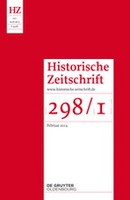
Historische Zeitschrift
Advancing Knowledge Through Historical AnalysisHistorische Zeitschrift is a prestigious academic journal dedicated to the field of history, published by WALTER DE GRUYTER GMBH. Established in 1859, the journal has a long-standing legacy of promoting scholarly discourse and research that spans pivotal eras from the 19th century to contemporary times. With an ISSN of 0018-2613 and an E-ISSN of 2196-680X, it is well-recognized in the academic community for its rigorous standards and contributions to historical scholarship. This journal is currently positioned in Quartile 3 of its category for 2023 and holds a respectable rank of #762 out of 1760 in Scopus, placing it in the 56th percentile for Arts and Humanities – History. Though not available in an open access format, Historische Zeitschrift continues to attract submissions from both emerging and established historians eager to contribute to an understanding of historical contexts and narratives. Its scope includes extensive historical analysis, discussions on methodology, and explorations of sources, making it an invaluable resource for researchers, professionals, and students alike who seek to deepen their insights into historical developments.

Lithuanian Historical Studies
Decoding the Cultural and Historical Fabric of LithuaniaLithuanian Historical Studies is a respected academic journal published by BRILL, focusing on the nuanced exploration of cultural, historical, and sociopolitical dynamics within Lithuania and its historical context. With an ISSN of 1392-2343 and an E-ISSN of 2538-6565, this journal aims to disseminate scholarly research that contributes to the understanding of Lithuania's cultural heritage and historical developments. Although it operates without an open-access model, its content is essential for researchers, professionals, and students interested in History, Cultural Studies, and Religious Studies. Ranked in the fourth quartile across several categories in 2023, including Cultural Studies and Sociology and Political Science, it provides a platform for academic discourse among those researching in the field. Despite its modest Scopus rankings, it plays a critical role in advancing knowledge within these disciplines and fostering dialogue across them, making it a valuable resource for anyone engaged in the study of Lithuanian or broader Eastern European history.
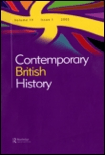
Contemporary British History
Illuminating Contemporary Narratives of the UKWelcome to Contemporary British History, the premier journal dedicated to the analysis and discussion of modern historiographical debates in the context of the United Kingdom. Published by Routledge Journals, Taylor & Francis Ltd, this journal holds significant prestige, recognized for its contributions to fields such as Cultural Studies, Development, History, Political Science, and Safety Research. As illustrated by its 2023 Quartile Rankings, it stands in the upper tiers among influential research publications, with a Q1 ranking in History. Following its converged years from 2001 to 2024, Contemporary British History has established itself as an essential resource for researchers, educators, and practitioners aiming to deepen their understanding of historical contexts and their implications for contemporary society. While the journal is not open access, it offers robust access options through academic institutions and libraries, supporting its mission to foster rigorous scholarly dialogue.
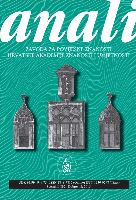
Anali Zavoda za Povijesne Znanosti Hrvatske Akademije Znanosti I Umjetnosti u Dubrovniku
Bridging Cultures Through Scholarly DiscourseAnali Zavoda za Povijesne Znanosti Hrvatske Akademije Znanosti I Umjetnosti u Dubrovniku, an influential academic journal published by the Croatian Academy of Sciences and Arts, Institute of Historical Sciences in Dubrovnik, serves as a significant platform for research and discourse within the fields of history, archaeology, literature, and cultural studies. Since its transition to Open Access in 1999, the journal has broadened its reach, making scholarly content accessible to a global audience. As a result of its commitment to quality and rigor, it has achieved respectable rankings across various disciplines — notably, a Q3 in Literature and Literary Theory and Q4 in several other categories in the 2023 evaluations. Located in the picturesque city of Dubrovnik, this journal not only highlights the rich historical narrative of Croatia but also contributes to international dialogues on related subjects. Researchers, professionals, and students will find invaluable insights and contemporary discussions in its pages, offering a unique perspective on the intersections of history, culture, and the arts.

Codrul Cosminului
Exploring Diverse Narratives in Cultural and Historical StudiesCodrul Cosminului, published by Stefan cel Mare University in Romania, is an esteemed open-access journal that has been facilitating scholarly discourse since 2004. With an ISSN of 1224-032X and an E-ISSN of 2067-5860, it plays a crucial role in the fields of Cultural Studies, History, Political Science, International Relations, and Religious Studies. The journal’s impact is evidenced by its 2023 categorization in Q2 for multiple disciplines, marking it as a reputable platform for researchers. This interdisciplinary journal serves as a vital resource for academics and practitioners alike, encouraging contributions that explore diverse cultural and historical narratives. The Scopus rankings further illustrate its relevance, positioning it within influential tiers across its fields. Researchers and students will find Codrul Cosminului invaluable for accessing high-quality, peer-reviewed content that enhances their understanding of complex societal and cultural dynamics.

RENAISSANCE AND REFORMATION
Charting the Intellectual Shifts of a Defining EraRENAISSANCE AND REFORMATION is a distinguished academic journal that serves as a vital resource in the fields of history, literature, arts, and philosophy, with a specific focus on the expansive cultural shifts from the Renaissance to the Reformation. Published in Canada, this journal provides scholars, students, and professionals with an avenue to explore the intricate dynamics that shaped early modern thought and practice. While it is not an open access publication, it maintains a commitment to high academic standards, reflected in its diverse range of quartile placements across various categories, including Q3 in Literature and Literary Theory and Q4 in History. The journal is crucial for advancing scholarly discourse on early modern studies and facilitates a deeper understanding of the cultural and intellectual transformations that occurred during this pivotal historical period. RENAISSANCE AND REFORMATION continues to attract contributions from leading researchers and emerging scholars alike, making it an essential read for anyone invested in the complexities of historical thought and artistic expression.
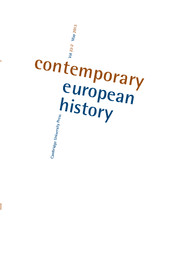
Contemporary European History
Advancing Interdisciplinary Insights in European HistoryContemporary European History is a leading academic journal dedicated to the exploration of significant historical events across Europe from 1992 to the present, published by Cambridge University Press. As a Q1 rated journal in the field of History, it boasts a robust impact factor, reflecting its high citation frequency and prominence among scholars. The journal serves as an essential platform for researchers, professionals, and students interested in contemporary issues and trends affecting Europe, promoting interdisciplinary dialogue and the exchange of ideas. With its commitment to high-quality scholarship, Contemporary European History provides insightful analyses that shape our understanding of recent historical dynamics, making it a vital resource for anyone looking to delve into the complexities of modern European history.

Istorija
Exploring the Depths of HistoryIstorija is a distinguished academic journal published by Vytautas Magnus University Education Academy, focusing on historical research and discourse. With its ISSN 1392-0456 and E-ISSN 2029-7181, the journal aims to disseminate high-quality scholarly articles that explore various facets of history, catering to an audience of researchers, educators, and students alike. Although currently not open access, Istorija remains committed to advancing historical scholarship by contributing valuable insights and fostering academic dialogue through an inclusive editorial process. Set against the backdrop of Vilnius, Lithuania, the journal engages with both regional and international historical narratives, making it a pivotal resource for those looking to deepen their understanding of historical events, methodologies, and interpretations. Whether you are a seasoned historian or a burgeoning scholar, Istorija offers a platform for the exploration and exchange of innovative ideas and research within the discipline.
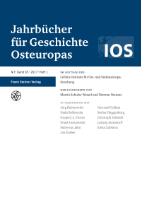
JAHRBUCHER FUR GESCHICHTE OSTEUROPAS
Uncovering the Layers of Eastern Europe's Historical JourneyJAHRBUCHER FUR GESCHICHTE OSTEUROPAS, published by FRANZ STEINER VERLAG GMBH, is a prominent academic journal dedicated to the exploration of Eastern European history. With its inception dating back to 1978, this journal has consistently provided a platform for scholarly discourse, contributing significantly to the understanding of the region's complex historical narratives. While the journal is not open access, it holds a solid reputation within the academic community, positioned in the Q4 quartile in history as per the 2023 category rankings, and stands at Rank #1636 within the Scopus Arts and Humanities History ranking. The convergence of its publication years throughout the decades emphasizes a long-standing commitment to historical research, thereby making it an essential resource for researchers, professionals, and students interested in Eastern European studies. Explore the intricate dynamics of historical events and cultural developments that shape Eastern Europe through this invaluable periodical.
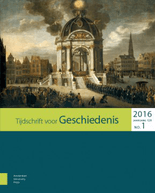
TIJDSCHRIFT VOOR GESCHIEDENIS
Engaging Minds in the Study of HistoryTIJDSCHRIFT VOOR GESCHIEDENIS is a prestigious academic journal published by WOLTERS-NOORDHOFF B V, dedicated to the field of history. With its ISSN 0040-7518 and an established reputation in the Netherlands, this journal serves as a vital platform for researchers, professionals, and students to disseminate and engage with significant historical scholarship. The journal's impactful contributions have earned it a commendable Q2 category ranking in the history field for 2023, placing it in the top tier of history journals according to Scopus. Although not open access, TIJDSCHRIFT VOOR GESCHIEDENIS offers invaluable insights into various historical topics spanning from its converged years starting in 1983 through to 2024. This enduring commitment to scholarly excellence fosters robust academic discourse and acts as an essential resource for those engaged in historical studies.